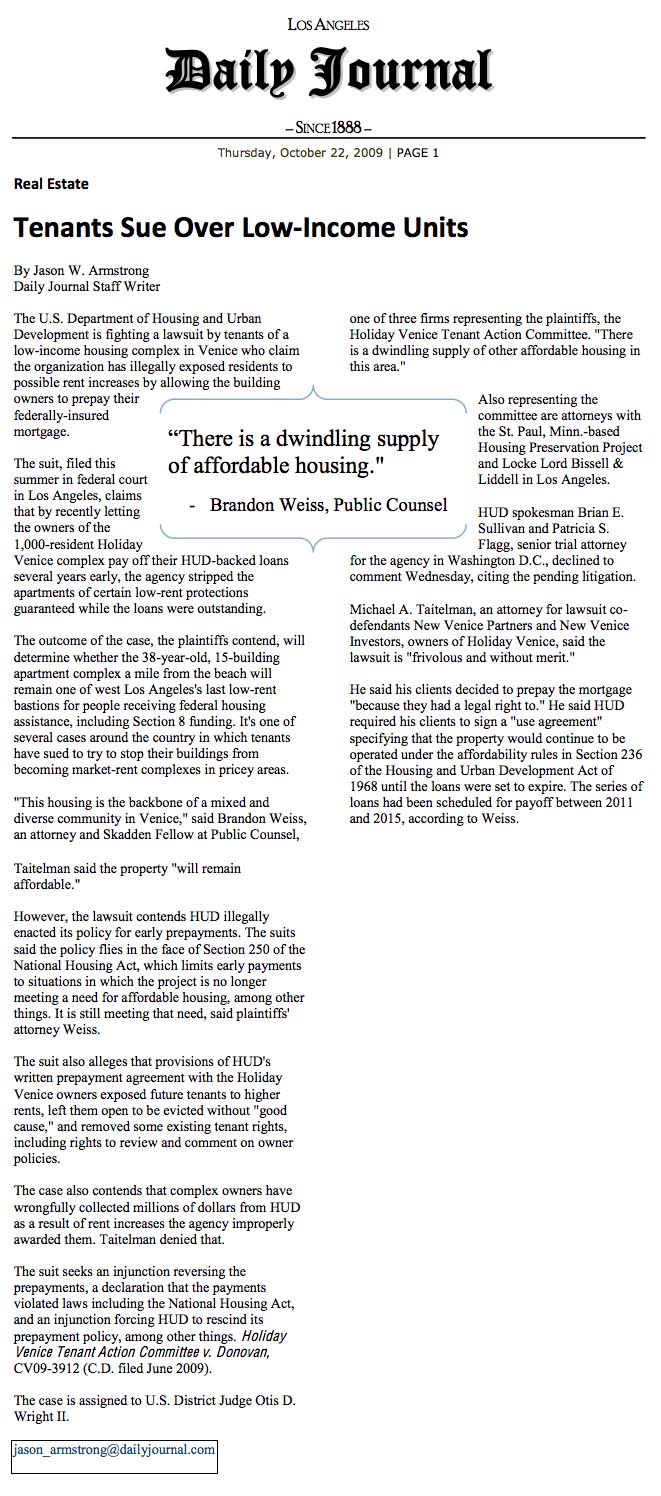The U.S. Department of Housing and Urban Development is fighting a lawsuit by tenants of a low-income housing complex in Venice who claim the organization has illegally exposed residents to possible rent increases by allowing the building owners to prepay their federally-insured mortgage.
The suit, filed this summer in federal court in Los Angeles, claims that by recently letting the owners of the 1,000-resident Holiday Venice complex pay off their HUD-backed loans several years early, the agency stripped the apartments of certain low-rent protections guaranteed while the loans were outstanding.
The outcome of the case, the plaintiffs contend, will determine whether the 38-year-old, 15-building apartment complex a mile from the beach will remain one of west Los Angeles’s last low-rent bastions for people receiving federal housing assistance, including Section 8 funding. It’s one of several cases around the country in which tenants have sued to try to stop their buildings from becoming market-rent complexes in pricey areas.
“This housing is the backbone of a mixed and diverse community in Venice,” said Brandon Weiss, an attorney and Skadden Fellow at Public Counsel, one of three firms representing the plaintiffs, the Holiday Venice Tenant Action Committee. “There is a dwindling supply of other affordable housing in this area.”
Also representing the committee are attorneys with the St. Paul, Minn.-based Housing Preservation Project and Locke Lord Bissell & Liddell in Los Angeles.
HUD spokesman Brian E. Sullivan and Patricia S. Flagg, senior trial attorney for the agency in Washington D.C., declined to comment Wednesday, citing the pending litigation.
Michael A. Taitelman, an attorney for lawsuit co-defendants New Venice Partners and New Venice Investors, owners of Holiday Venice, said the lawsuit is “frivolous and without merit.”
He said his clients decided to prepay the mortgage “because they had a legal right to.” He said HUD required his clients to sign a “use agreement” specifying that the property would continue to be operated under the affordability rules in Section 236 of the Housing and Urban Development Act of 1968 until the loans were set to expire. The series of loans had been scheduled for payoff between 2011 and 2015, according to Weiss.
Taitelman said the property “will remain affordable.”
However, the lawsuit contends HUD illegally enacted its policy for early prepayments. The suits said the policy flies in the face of Section 250 of the National Housing Act, which limits early payments to situations in which the project is no longer meeting a need for affordable housing, among other things. It is still meeting that need, said plaintiffs’ attorney Weiss.
The suit also alleges that provisions of HUD’s written prepayment agreement with the Holiday Venice owners exposed future tenants to higher rents, left them open to be evicted without “good cause,” and removed some existing tenant rights, including rights to review and comment on owner policies.
The case also contends that complex owners have wrongfully collected millions of dollars from HUD as a result of rent increases the agency improperly awarded them. Taitelman denied that.
The suit seeks an injunction reversing the prepayments, a declaration that the payments violated laws including the National Housing Act, and an injunction forcing HUD to rescind its prepayment policy, among other things. Holiday Venice Tenant Action Committee v. Donovan, CV09-3912 (C.D. filed June 2009).
The case is assigned to U.S. District Judge Otis D. Wright II.





